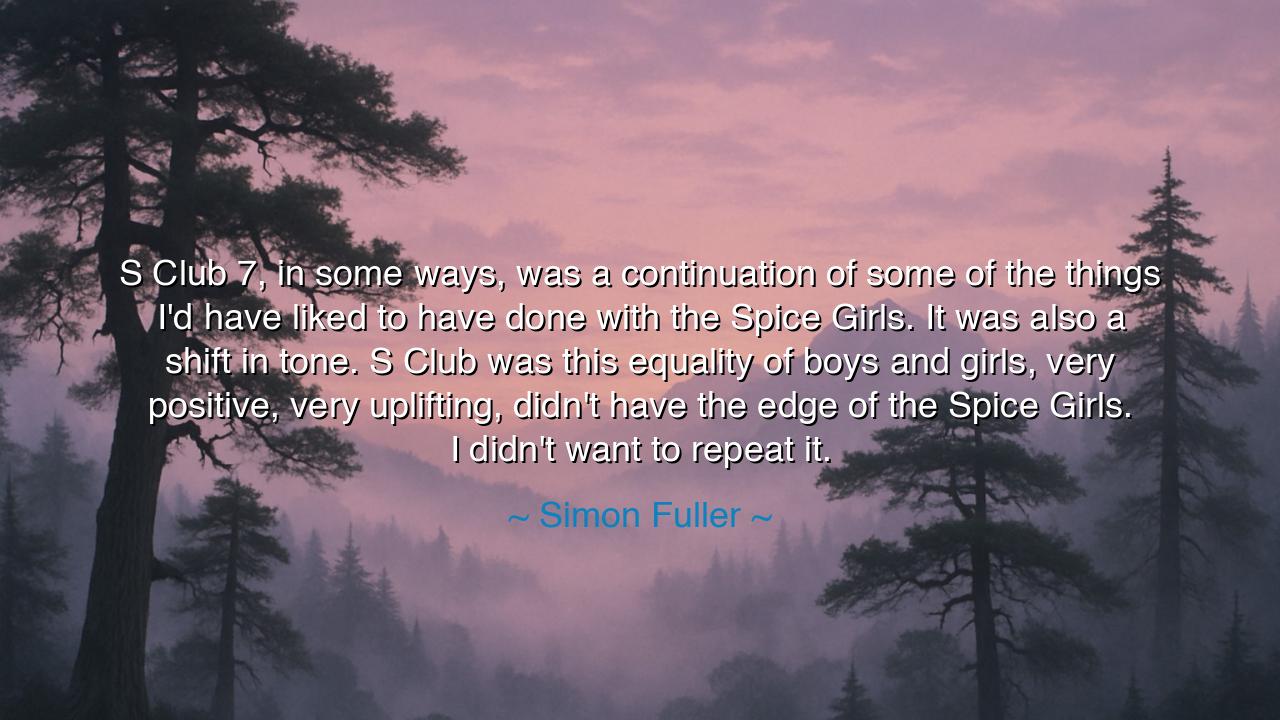
S Club 7, in some ways, was a continuation of some of the things
S Club 7, in some ways, was a continuation of some of the things I'd have liked to have done with the Spice Girls. It was also a shift in tone. S Club was this equality of boys and girls, very positive, very uplifting, didn't have the edge of the Spice Girls. I didn't want to repeat it.






The words of Simon Fuller—“S Club 7, in some ways, was a continuation of some of the things I’d have liked to have done with the Spice Girls. It was also a shift in tone. S Club was this equality of boys and girls, very positive, very uplifting, didn’t have the edge of the Spice Girls. I didn’t want to repeat it.”—resound with the wisdom of an artist who understands that creation must flow forward, not circle endlessly backward. He speaks of honoring what has come before, yet daring to take it further, reshaping it into something fresh, something balanced, something radiant. For in every generation, the song must be sung anew.
The origin of this wisdom lies in the ancient rhythm of innovation. Great works are not built by mere imitation, but by evolution. The Spice Girls, fierce and unapologetic, gave the world the fire of “girl power,” a cry for identity and boldness. But Fuller recognized that to walk the same path again would be to repeat rather than to expand. With S Club 7, he sought equality, not only the strength of girls, but the harmony of both boys and girls together. Thus, a new voice was born—less sharp in its edge, but no less strong in its joy.
This truth has been lived out in every age. Consider the transition from classical Greece to Rome. The Greeks gave the world philosophy, art, and the heroic individual. But Rome, inheriting their spirit, shifted the tone toward law, unity, and the collective. They did not merely repeat Greece, but reshaped its legacy to suit their time. So too, Fuller, with S Club 7, took the flame of one cultural moment and carried it into a new form, creating harmony rather than rebellion, uplift rather than challenge.
History also recalls Walt Disney, who at first created short films of laughter and whimsy, like Mickey Mouse, but then shifted to uplifting tales that carried deeper meaning—Snow White, Bambi, Cinderella. He understood that each creation has its season, and each season demands its own tone. To repeat would be stagnation; to evolve was life. His work, like Fuller’s vision, shows that true artistry is not bound to what has already succeeded, but to what still longs to be born.
The lesson is clear: when building upon past triumphs, do not simply repeat. Take what was powerful and ask what is missing, what new harmony might arise. The Spice Girls gave voice to female empowerment, sharp and daring. S Club 7 brought in balance, community, and positivity. Both mattered, both inspired, yet they lived in different registers of the same great song of humanity. The wisdom lies in knowing when to continue and when to shift.
Practical wisdom urges us: in your own life, do not cling to old victories as if they were enough. Celebrate them, yes, but let them be stepping stones to something greater. If yesterday you stood alone in strength, tomorrow you might build strength with others. If once your voice was sharp, perhaps now it can be gentle. Ask always: What does this moment require? In this way, your life becomes not a repetition, but a symphony of evolving themes.
Thus, let Simon Fuller’s words endure as counsel: honor the past, but do not be trapped by it. Every creation, every movement, every life must grow, must shift, must adapt. The edge of one era may give way to the uplift of another. The fire of rebellion may give birth to the harmony of community. And in all things, the greatest wisdom is to move forward with courage, crafting not echoes of yesterday, but the living songs of today.






QNPhan Quynh Nhu
Simon Fuller’s desire to not repeat the Spice Girls’ formula with S Club 7 is an interesting approach to keeping things fresh. The shift in tone from edgy to more positive and equal was probably what set S Club 7 apart at the time. It makes me think—did this shift also impact how fans related to the group? Were they looking for something new and different, or were they still drawn to the classic pop energy?
DHdinger heimer
This quote sheds light on Simon Fuller’s approach to the evolution of his groups. Moving from the Spice Girls’ bold and sometimes rebellious image to the more positive, inclusive vibe of S Club 7 is quite a shift. I’m curious—do you think S Club 7’s success was partly due to this change in tone, or was it the unique chemistry between the group members that made it work so well?
VDLe Van Di
Simon Fuller’s comment about the tone shift between S Club 7 and the Spice Girls makes me think about the evolution of pop music groups. It’s interesting that he wanted S Club to embody equality between boys and girls. Was there a specific reason for this change in message? Did he feel that the Spice Girls’ 'edge' was limiting, or was he simply aiming for a new direction in pop music?
LMlinh mai
It's fascinating that Simon Fuller viewed S Club 7 as a shift from the Spice Girls, yet still a continuation of certain ideas. I can understand the need for reinvention and growth, especially when you’ve already done something as iconic as the Spice Girls. I wonder, though, did S Club 7’s positive tone resonate more with the audience because it was a departure from the 'edge' of the Spice Girls?